Geneva, Switzerland — US President Donald Trump declared a “total reset” in US-China relations after a “very good” first day of trade talks with Chinese officials in Switzerland. The meeting, which took place in Geneva, was described by Trump as a constructive and friendly discussion, marking a significant breakthrough in the ongoing trade negotiations between the two economic giants.
A New Beginning in US-China Trade Relations
Trump took to Truth Social late Saturday, stating:
“A very good meeting today with China, in Switzerland. Many things discussed, much agreed to. A total reset negotiated in a friendly, but constructive, manner. We want to see, for the good of both China and the U.S., an opening up of China to American business. GREAT PROGRESS MADE!!!”
The trade talks, which began at 10 a.m. local time (0800 GMT) and stretched for over eight hours, included a lunch break and concluded at approximately 8 p.m.. US Treasury Secretary Scott Bessent and Trade Representative Jamieson Greer led the US delegation, while Vice Premier He Lifeng spearheaded the Chinese team.
Efforts to Ease Trade Tensions
The discussions came as part of ongoing efforts to ease trade tensions between the US and China. Earlier this year, tensions peaked when the US imposed tariffs of up to 145% on Chinese imports, prompting retaliatory tariffs from China, some reaching 125% on US goods.
In the lead-up to the talks, President Trump stated that an 80% tariff on Chinese goods “seems right,” as he pushed for the best possible outcome for the American economy. The White House has expressed its full backing for Trump’s team, underscoring their commitment to securing the “best deal possible for America”.
What’s Next?
The talks are set to continue on Sunday, with details about the content or tone of the discussions remaining undisclosed after the initial meeting. However, the early signs indicate that both parties are focused on resolving issues surrounding trade imbalances, tariffs, and access for American businesses in China.







